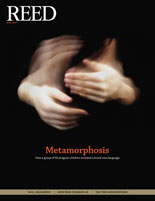
IRIS login | Reed College home Volume 92, No. 2: June 2013
Apuleius Unbridled (continued)

Photo by Leah Nash
Sabnis’ passion for Apuleius would have been hard to predict 20-odd years ago when she first encountered Latin as an eighth grader in Southern California. Then, she was drawn to the puzzle the language presented—to “the challenge of doing the grammar in a way that balanced.” Latin was a dead language to her, and it didn’t come alive, really, until, as a junior at Columbia University, she spent a semester in Rome, where suddenly the wonders of the ancient world were all around her, as taxis and Vespas spritzed about in the streets. She went to restaurants and ate in grotto-like basements where the brickwork was a remnant from the Theatre of Pompey, completed in 55 BC. She saw the Norwegian folk pop duo, the Kings of Convenience, play amid the ruins of Ostia, an old Roman harbor town. “I was in a place that had never not been a Roman city,” she remembers, with delight. “There are layers and layers of history in Rome, and you have to interact with all of them.” Sabnis began realizing that being a classical scholar was all about connecting the ancient to the modern. She asked herself, “Why would I ever want to do anything else?”
Eventually, as her Latin evolved, Sabnis came to recognize that Apuleius is like, say, James Joyce or Vladimir Nabokov, a nimble trickster with language—so deft that he can load brief phrases with political satire. When Lucius shambles into the barn as a donkey, for instance, Apuleius ironically gives him highfalutin airs, so that he expects loca lautia—that is, the red carpet treatment reserved for Roman noblemen. As Lucius lasciviously eyes a comely slave maiden stirring a pot, Apuleius describes him as obstupui, or stupefied, thereby making a sarcastic allusion to Virgil’s Aeneid, wherein the mighty hero gazes obstupui upon the fall of Troy.
Readers don’t need to understand the references to catch the drift. “He’s offering a critique,” Sabnis says, “but you don’t have to give it deep thought. It’s light entertainment.” The wry mix of the satirical and the sublime sings to Sabnis. “Well,” she says, “I grew up in the ’80s, in front of the television.” She herself has a knack for wordplay. In the photo on her Reed website, she clutches a small placard reading, “LAETABERIS,” which is Latin for “You shall rejoice.” Follow the link to Sabnis’ personal website, and you’ll find “something I did when I was supposed to be working on my dissertation”: a small drama that Sabnis created by moving plastic figurines around on her desk and snapping photos. We see the Belgian cartoon hero, Tintin, the boy reporter, cowering inside a clay lamp. He is attacked by two Swiss knights bearing battle-axes, only to be later saved by a gaunt, almond-eyed space alien. “Bravo!” Sabnis writes in a caption. “But how was the clay lamp mixed up in all of this?”
Spurious? Well, for centuries, many belletrists regarded The Golden Ass itself as throwaway—as nothing but an amusing donkey romp through the Greek countryside. But then in 1985, John J. Winkler, a Stanford professor and erstwhile Benedictine monk, attacked that reading with his book, Auctor and Actor: A Narratological Reading of Apuleius. Winkler called The Golden Ass “a philosophical comedy about religious knowledge”—and also described the book as a detective novel challenging the reader with “hermeneutic entertainment.” He explained that 60% of the text consists of 15 tales that Lucius, the narrator, pastes in while taking breaks from his own asinine autobiography. There is, for instance, a story a baker tells about an adulterous wife and a long fable that an old woman tells about a love affair between the god Cupid and a mortal girl named Psyche. All of these stories—indeed the whole of The Golden Ass—is shrouded, Winkler feels, in complexity. We don’t know how credible the storytellers are, or what their agendas are, and we need to read as gumshoes might. We need to be discerning from the very moment, a few lines into the prologue, when Apuleius signals that we’re stepping into a swamp of ambiguity. “Quis ile?” he asks before introducing Lucius. “Who’s speaking?”
At a recent conference of her Latin 312 class, Sabnis spoke of how easily Psyche enters the underworld: “She just walks right in, as compared to Virgil’s Aeneas, who has great difficulty getting into the underworld. You can read Psyche’s story as a dream or as allegory. It’s up to the reader.” One student said, “I’m reminded of Augustine, who says that reading Scripture is like a puzzle.”
Many of Sabnis’ students diverge from her take on The Golden Ass, however, to embrace the book as a growing-up story and Lucius as a sort of ancient world big brother to Holden Caulfield. “Lucius’ curiosity accompanies him throughout his journey, even when times are most difficult and dismal,” Brian Urrutia ’09 wrote in a paper for Sabnis. “Is this so unlike a student at Reed?” Helen Spencer-Wallace ’14, who is readying to write her junior qualifying paper on The Golden Ass, is meanwhile intrigued by how Lucius, a recent college grad and budding professional, negotiates the pressure to conform. “Everyone has to appear to conform, and then not conform,” she says. “Lucius is figuring out how to do that.”
At the end of The Golden Ass, Lucius seems to conform completely. The goddess Isis metamorphoses the donkey Lucius back into a man—and then insists that, in exchange, “All the remaining days of your life must be dedicated to me.” Lucius lets himself be led, sheep-like, to the temple, and when he steps inside, to encounter, within “the secret recesses,” a stack of sacred texts, he’s all gaga, reveling over the books’ “unknown characters.”
If Apuleius left it at that, we might take him at face value. But no, he begins to lay the whole reverence shtick on with a trowel, describing the books’ “hierographically painted animals” and their “wreathed and twisted letters with tails that twirled like wheels or spiraled together like the vine tendrils, so that it was altogether impossible for any peeping profane to comprehend.”
We’re lost in the fun house, ultimately, and that’s exactly where Apuleius wants to keep us, laughing, and trying to figure out the magic underlying all his tricks.
- Previous Page
- 1
- 2
- Next Page

LATEST COMMENTS
steve-jobs-1976 I knew Steve Jobs when he was on the second floor of Quincy. (Fall...
Utnapishtim - 2 weeks ago
Prof. Mason Drukman [political science 1964–70] This is gold, pure gold. God bless, Prof. Drukman.
puredog - 1 month ago
virginia-davis-1965 Such a good friend & compatriot in the day of Satyricon...
czarchasm - 4 months ago
John Peara Baba 1990 John died of a broken heart from losing his mom and then his...
kodachrome - 7 months ago
Carol Sawyer 1962 Who wrote this obit? I'm writing something about Carol Sawyer...
MsLaurie Pepper - 8 months ago
William W. Wissman MAT 1969 ...and THREE sisters. Sabra, the oldest, Mary, the middle, and...
riclf - 10 months ago